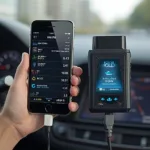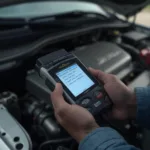Subaru vehicles, known for their all-wheel-drive capability and boxer engines, utilize the OBD2 standard, just like other cars sold in the US after 1996. But knowing that your Subaru uses OBD2 isn’t the whole story. Understanding the specific OBD2 communication protocol your Subaru uses is key to getting the most out of your diagnostic scanner.
The majority of Subarus manufactured since 1996 use the ISO 9141-2 communication protocol. However, some models, particularly those produced before the mid-2000s, may use the ISO 14230 (KWP2000) protocol. Knowing which protocol your specific Subaru uses can be crucial for successful diagnostics. Why? Because not all OBD2 scanners support all protocols equally. Using a scanner incompatible with your car’s protocol can lead to inaccurate readings or communication failures. If you’re unsure about which OBD2 scanner to purchase, checking its protocol compatibility is essential. You can also consult your owner’s manual or a reliable online resource like OBDFree.com for specific information regarding your Subaru model year.
If you’re interested in checking out an affordable OBD2 scanner option, take a look at our article on obd2 harbor freight scanner won’t connect. It offers valuable troubleshooting tips.
Understanding OBD2 Protocols in Subaru
OBD2, or On-Board Diagnostics II, is a standardized system that allows external devices to access diagnostic information from a vehicle’s computer. This system uses several communication protocols, which are essentially the languages used to transmit data between the car and the scanner. While all OBD2 compliant vehicles use the same connector, the language, or protocol, can differ. For Subarus, understanding this nuance can be especially important for effectively troubleshooting issues.
Which Specific Subaru Models Use Which Protocol?
Determining the exact protocol for your Subaru depends heavily on the model year. As a general rule, Subarus from 1996 to the early 2000s predominantly used ISO 9141-2. Later models, particularly those from the mid-2000s onward, are more likely to use the CAN protocol, though ISO 9141-2 can still be found in some vehicles. This transition mirrors the broader automotive industry’s shift towards the faster and more versatile CAN protocol.
How Do I Determine My Subaru’s OBD2 Protocol?
Several methods exist for pinpointing your Subaru’s OBD2 protocol. Consulting your owner’s manual is often the quickest route. The manual usually lists the specific protocol or provides information about OBD2 compatibility that can help you determine the protocol. Online resources, such as OBDFree.com, can also be valuable, offering detailed information about different Subaru models and their corresponding OBD2 protocols. You can find more information about the OBD2 port pinout here: obd2 port pinout.
Why is Knowing the Protocol Important for Diagnostics?
Using an OBD2 scanner compatible with your car’s communication protocol is essential for accurate diagnostics. An incompatible scanner may not be able to communicate with your Subaru’s computer, resulting in a failure to retrieve diagnostic trouble codes (DTCs) or other vital information. This can lead to misdiagnoses and wasted time and effort in troubleshooting.
“Using the correct protocol is like speaking the right language to your car,” says John Miller, a seasoned automotive diagnostician. “If you’re speaking Spanish to someone who only understands French, you won’t get very far. The same principle applies to OBD2 diagnostics.”
Troubleshooting Common Issues with Subaru OBD2
Occasionally, you might encounter problems connecting to your Subaru’s OBD2 system even with a compatible scanner. Common issues include a blown fuse for the OBD2 port, a faulty OBD2 cable, or issues with the car’s battery. Checking the fuse box and ensuring a stable battery connection are good first steps in troubleshooting.
“Always start with the basics,” advises Sarah Chen, an experienced automotive technician. “A simple blown fuse can often be the culprit behind OBD2 connection problems. Checking these small details can save you a lot of headaches.”
Are you interested in more specific information about the 2004 Subaru STI? We have a dedicated page for that: obd2 port 2004 sti.
Conclusion
Understanding what OBD2 protocol your Subaru uses is crucial for accurate diagnostics and effective troubleshooting. While the majority of Subarus use ISO 9141-2, confirming the protocol for your specific model year is vital for choosing the right OBD2 scanner and ensuring successful communication with your car’s computer. Utilizing online resources like OBDFree.com and consulting your owner’s manual are excellent ways to verify the protocol and optimize your diagnostic efforts. This ensures you can get the most out of your OBD2 scanner and keep your Subaru running smoothly.
FAQ
- What is the most common OBD2 protocol used by Subarus?
- ISO 9141-2 is the most common, especially in older models.
- Where can I find information about my Subaru’s specific OBD2 protocol?
- Your owner’s manual or online resources like OBDFree.com are great sources.
- Why is my OBD2 scanner not connecting to my Subaru?
- Possible reasons include a blown fuse, a faulty cable, or battery issues.
- Do all OBD2 scanners work with all Subaru models?
- No, ensure your scanner supports the specific protocol used by your Subaru.
- Can I use an OBD2 scanner to program a key for my Subaru? Learn more about key programming with OBD2 scanners: how to program a key with obd2 scanner.
- While some scanners offer this functionality, it depends on the scanner and the Subaru model.
- Can I use a universal catalytic converter with my Subaru? Explore the topic further: obd2 universal catalytic converter.
- Check your local regulations and consult a mechanic to ensure compatibility.
- What should I do if my OBD2 scanner is still not working?
- Consult a qualified automotive technician for further diagnosis and assistance.
Need further assistance? Contact us via WhatsApp: +1(641)206-8880 or Email: [email protected]. Our customer support team is available 24/7.

